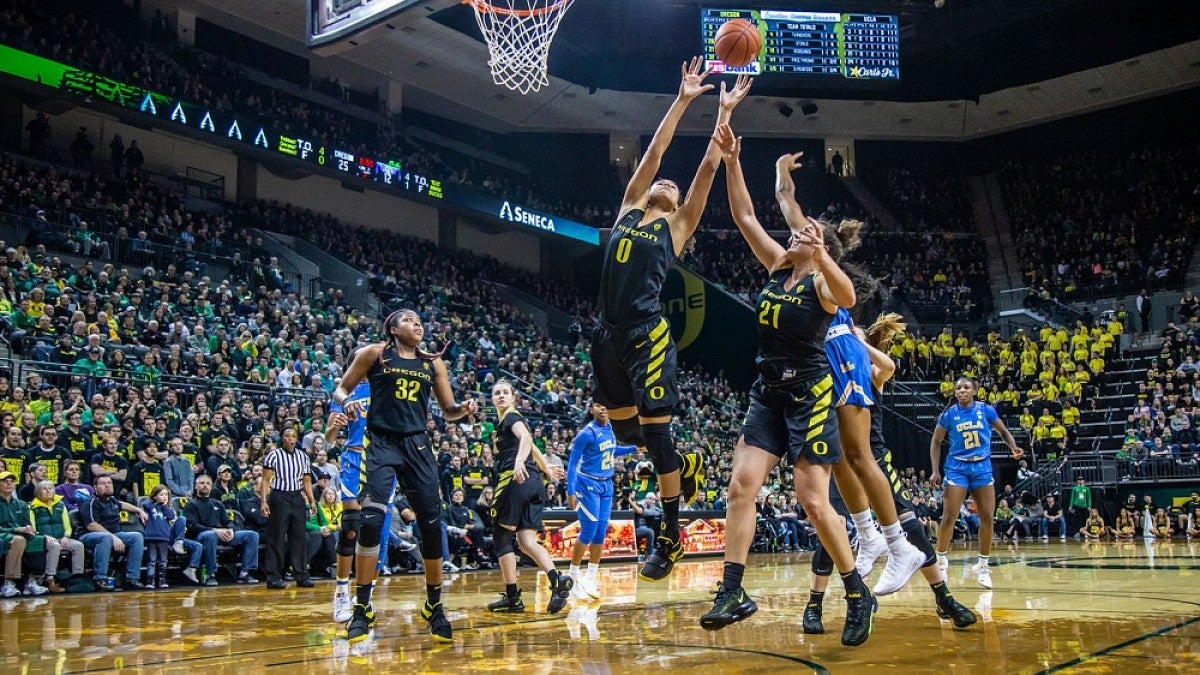The strong history of women in sports leadership at the UO is gaining traction as the university partners with Wasserman Media Group for “The Collective Think Tank,” an initiative dedicated to advancing women in sports that launches this fall.
The partnership, which includes 10 schools in the United States, Canada and Europe, will leverage the UO’s research power by engaging students in programs like the Warsaw Sports Marketing Center at the Lundquist College of Business. It also will tap a pool of faculty experts who will be matched with research funding through Wasserman’s industry partners to look at issues such as pay equity, product design, maternity in sport and other topics that affect women.
A sports marketing and talent management company, Wasserman’s goal with founding the initiative is to study inequities women face in sports and publish insights based on data and research that will inform new approaches in the industry. Wasserman officials also want to raise awareness of the issues among fans, consumers and participants.
The partnership is rooted in the Warsaw Center under the leadership of its director, Whitney Wagoner. The center has a longstanding relationship with Wasserman, which also represents former Duck basketball stars Ruthy Hebard and Satou Sabally.
“This is in our DNA,” Wagoner said. “We have always been champions of the role of women in this industry. So this is a celebration, an affirmation and an amplification of what already exists.”
She also highlighted the center’s familiarity with Wasserman as a major employer of UO graduates, describing the think tank partnership as a “level-up” of the existing relationship.
Prior to the partnership, the UO formed a focus group of campus faculty members to define UO-related opportunities around the World Athletics Championships Oregon22 event, previously planned for 2021 but shifted to 2022 due to the COVID-19 pandemic. Interdisciplinary work around women in sports emerged as a key element early on in the conversations.
“We have so many areas of strength in sports and wellness across the entire university,” Provost and Senior Vice President Patrick Phillips said. “Leadership in women in sport is an important part of who we are as a university and provides a great opportunity to contribute our expertise to help guide the conversation on a worldwide scale.”
Phillips expects the UO to take advantage of that impact.
“The think tank looks at bigger issues than buying tickets and sporting gear,” said Carlyn Schreck, assistant vice president of presidential initiatives at the UO. “We’re looking at societal issues, like how does sport help move women’s rights and the needs of women and families forward.”
One way UO shines in this area is through its “Women in Flight” program, a branded philanthropy channel of the Duck Athletic Fund that bridges the gap for women’s sports. A similar program exists at the University of North Carolina-Chapel Hill, another school involved with the think tank. The new partnership will have the potential to allow the two schools to showcase their expertise in the area and use the power of the initiative to inspire other athletic departments to explore the idea.
As for the faculty research partnerships through the think tank, Schreck described them as a win-win.
“Wasserman has the industry partners and athletes. Universities have research and independent thought,” she said. “The think tank provides industry with different kinds of research access than they typically would have and provides faculty with great connections into the more commercial world.”
Wasserman will also be involved with Wagoner’s MBA-level sports marketing class this winter. The class is the curricular foundation for sports business students and will let them create an athlete marketing plan that aligns female players with corporate sponsorships.
MBA students also complete a required, two-term corporate consulting project for which Wasserman will be the client. The topic will be defined in an area related to women in sports, Wagoner said.
The overarching goal is to produce a legacy that cements the UO as a destination for faculty members and students who want to study, lead and participate in the business of women’s sports. Through an ongoing body of work and a series of published white papers, UO faculty members will contribute to a tangible knowledge base that Wagoner and Schreck hope will be a catalyst for improvement.
They also see the effort as a measurable turning point for the industry.
“We’d love the World Championships to be a marker in the past where things were different before and after it,” Wagoner said.
Whether the outcome of the think tank’s work is a set of criteria, a definitive research product, an algorithm or a database, or something else yet to be defined, Wagoner said, “We need to go beyond talking and celebrating, and change has to be made.”
—By Anna Glavash Miller, University Communications


